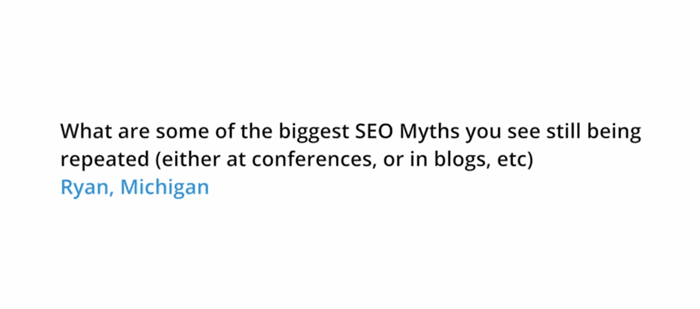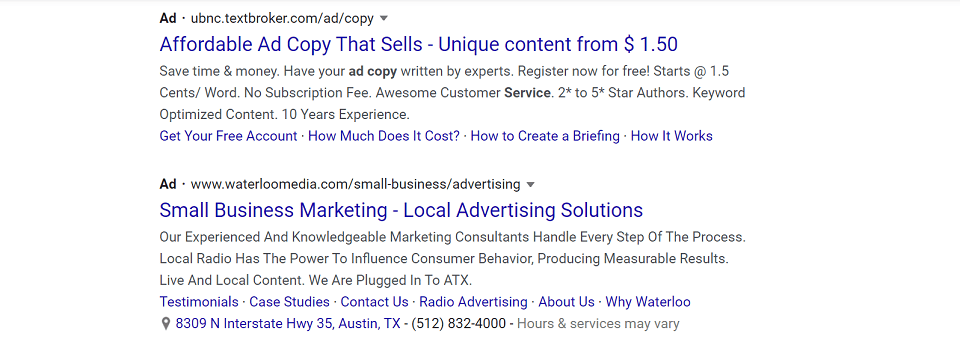I spend a ton of time online educating myself about the latest SEO trends, reading materials from the thought leaders, and running experiments myself to figure out whether or not the discourse is on point or not. Curiously enough, I happened upon two brand new items today focused on SEO Myths.
Let’s take a moment to consider the myths presented in Eric Enge’s (of Stone Temple Consulting) guest post on Forbes, 7 Modern Age SEO Myths, and the new Matt Cutts video titled What Are Some Myths About SEO? (embedded below).
Analyzing Eric Enge’s 7 SEO Myths
Enge is well known as a smart SEO and thought leader in the space. I read his work very often, and he always makes excellent points. In this post, he did not disappoint. Let’s look at each of the myths individually.
Guest Posting is Bad
This is one of the big ones, made even more of an issue by the Matt Cutts “stick a fork in it” blog post I wrote about previously. Now, I have clients and colleagues all asking me if I still believe in guest posting. I keep hearing rumors of panicked website owners reaching out to all the places where they’ve submitted guest posts to ask for nofollow to be added to the links or for the links to be removed altogether!
This is a massive overreaction to Matt’s blog post, which was venting about spammy, SEO-only guest posting. It’s about blasting out a form letter pitching a bunch of bloggers on why they should accept a guest post, which later appears and is poorly written.
Eric clears it up – do the guest posting for exposure to a new audience. Make SEO a nice value add, not the main goal, and you’ll go about it the right way. I concur 100%.
Social Signals Drive SEO
Enge draws a clear line between Social Media activity and SEO, and he is a strong advocate of looking at them as completely separate strategies. It is true that the search engines have gone on record saying that social does not currently impact SERP positioning.
While I agree with him in general, I must disagree with one thing – Social does in fact impact your ranking, only indirectly. The thing is, we have to consider whether our website ranking or our overall web visibility matters more. If visibility is the goal, then social matters because profile pages and even Google+ status updates can rank on their own. If those profiles and updates refer to our content on the site, that’s indirect impact on traffic, ranking for something that references the site rather than the site itself.
Of course, there’s also the matter of Search Plus Your World, where results are modified according to whom we connect on Google Plus. It seems no one in the SEO industry wants to take a stance on SPYW and it’s impact on performance. Realistically, there is no scientific way to affect rankings based on social connections of this nature…yet. Someone will surely figure it out before too long.
All that said, I agree with his stance philosophically. But it’s a stretch to say that there’s absolutely no impact, even if causation can’t be proven, and the impact could be indirect and small.
The Emphasis on Back Links Is Fading
I am unsure where this originated, but backlinks continue to play the biggest role in website ranking. You can look at all sorts of studies and the answer is the same – a healthy link profile will do wonders for your online visibility and help your website rank well.
The following excerpt from the Forbes article states my next point perfectly, so I’ll just quote the article and leave it at that.
The search engines won’t move away from using links as a ranking signal until the have a better signal source, and they don’t have that yet. In fact, Google’s Matt Cutts recently confirmed that they have tested a version of Google that does not use links as a ranking factor, and they abandoned it.
Google SERPs Are Broken
I don’t even know what “SERPs are broken” is supposed to mean. The quality of the results I’m seeing today is better than it was before Google’s onslaught of penalties. This myth couldn’t be farther from the truth.
Eric calls out that Google still owns around 2/3 of the overall search market in the US, and also mentions that they sit at 80% or higher in most major internet markets. This is all true, and good evidence that Google’s SERPs are alive and well, and working fine. For more information about Google’s share in other countries, here is a table of the market share for the top two search engines in each major country.
AuthorRank is Impacting Rankings
I’ve written quite a bit about the vision for AuthorRank, where Google builds individual authority metrics into ranking of original content. Initially, I thought that seeing author thumbnails in the SERPs was proof of this starting to impact rankings.
In reality, AuthorRank is still in its infancy for search purposes. It serves more of a semantic search role than it impacts overall ranking. Yes, having the thumbnail next to your blog post or in-depth article appears to raise the click thru rate, which is absolutely an SEO benefit. But beyond that, we haven’t yet seen what will come of author markup beyond semantics.
To add to Eric Enge’s analysis, the fact that we are still seeing so many manual penalties levied by Google, in many cases against known white hat SEOs (e.g. the Portent penalty from March 2014), says a lot. If author markup were being used to drive ranking according to individual authority, that penalty would have been very unlikely to happen. Anyone who keeps up with SEO knows that Ian Lurie is not a prime target for an SEO slap.
Ranking Correlation Studies Reveal How Google Ranks Sites
Every year, we see the SEO Ranking Factors data that suggests what SEO tactics most influence ranking. In the past two years, social signals showed up as highly influential on ranking. The natural conclusion across the industry was that social is officially in the game!
Not so fast, Eric advises. There’s a huge difference between correlation, meaning when one metric moves up another seems to also move up, and causation, meaning one happens because the other occurred. He makes a good point, that social shares and activities tend to happen more when content is especially good. From that angle, it suggests that social doesn’t cause rankings to move a bit, but that they are an indicator of overall success in messaging, writing, and distributing / promoting the content. Of course, great content tends to get more links and rank better. Makes perfect sense.
SEO Is Now Content Marketing And Nothing More
This is one of the myths that gives me heartburn. Having been in SEO and content marketing for most of my career, I can tell you that “build it and the traffic will come” is rarely true. There are many layers of optimization (both technical and on page) as well as promotion that must be built on top of the content.
Now the big talk is that we should just build premium content items and watch the links roll in. Maybe that will work for a site with high domain authority already, because it will rank immediately, but content is a long game when you are first starting out. Start building it out over time, and eventually, you’ll have a library of materials. Compose multiple formats, including multimedia, and promote it when you can.
Eric advises to use content as a way to build up visibility in aggregate and your own reputation. That’s solid advice. Once you have those two in motion, it becomes much easier to earn real links over time. Before you have a reputation, it is much harder to earn links as an unknown source.
It would also be foolish to think that keyword targeting, technical optimization, and on page optimization no longer play a role in ranking. The same piece of content will do much better if focused on a target keyword or tight topic, on a well performing website, with all the right on-page items in place (page title, image alt-text, etc.). We even have new SEO tools in schema markup today. SEO remains crucial to the success of all that content you will need to produce, so don’t overlook the blocking and tackling.
Matt Cutts SEO Myths Discussed
I always like to check out the various videos that Matt publishes to answer industry questions, mostly focused on search engine optimization related topics. Let’s run through the myths he shares in the video, which I have embedded into the end of this blog post.
Spending More On AdWords Helps A Site Rank (And Vice Versa)
I’ve heard countless SEM and SEO professionals speculate that this is, in fact, true. It makes sense logically. Google is a business, and they have to pay the bills. Why wouldn’t they act in their own self interests?
While a lot of naysayers would dig in on this point, I tend to give Google the benefit of the doubt. They’ve been through numerous federal investigations on this very topic, among others related to their series of SEO penalties. While results have been different across the globe, they’ve come out of each case looking clean in the US. Until we have some sort of proof, this should remain labeled as nothing more than rumor, myth, and conspiracy theory.
Snake Oil Salesmen Will Teach Us Tricks That Work
Matt uses the example of how internet marketers can get pulled into groupthink, jumping on the latest ranking and traffic bandwagon to get hyped by the black hat forums and internet marketing “gurus”. This is one of the areas where far too many of us have gotten sucked into a myth at least once in the past.
His logic is very compelling on this one. If someone knows a trick that can make them “mountains of cash”, why would they be selling a system or blueprint for it? Why not just keep raking in the dough, rather than sharing your secret sauce with the masses for $27 (with 9 free gifts valued at $1,799!)? No matter whether it’s an ebook or some automated software package that supposedly fixes everything, common sense should make you take pause.
In Closing
He closes by advising us to keep in mind what Google is trying to do: present better quality SERPs. Not just for Google, but also for the users, who can get frustrated when a spammer manages to trick the algorithm.
I always say, SEO is about doing what we need to do to rank within the “spirit of the rules”. Black Hat SEO is the exact opposite, where the SEO tries to find all the loopholes in the logic. If you want to play that game, it promises to be an ongoing game of cat and mouse. It’s not for me, thank you.
Watch the SEO Myths Video from Matt Cutts:
Tommy Landry
Latest posts by Tommy Landry (see all)
- PPC for Car Dealerships – How This Niche Differs From The Others - July 23, 2024
- Trademarks in PPC – What You Need to Know and What to Avoid - July 16, 2024
- PPC Trends and Statistics for 2024 - July 9, 2024





